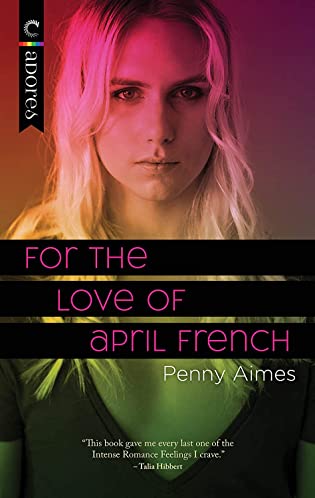 For the Love of April French by Penny Aimes
For the Love of April French by Penny Aimes Format: eARC
Source: supplied by publisher via NetGalley
Formats available: paperback, ebook
Genres: contemporary romance, LGBT
Pages: 352
Published by Carina Adores on August 31, 2021
Purchasing Info: Author's Website, Publisher's Website, Amazon, Barnes & Noble, Kobo, Bookshop.org
Goodreads
An Entertainment Weekly Best Romance of Summer 2021!
“This book gave me every last one of the Intense Romance Feelings I crave.” —New York Times bestselling author Talia Hibbert
April French doesn't do relationships and she never asks for more.
A long-standing regular at kink club Frankie's, she's kind of seen it all. As a trans woman, she’s used to being the scenic rest stop for others on their way to a happily-ever-after. She knows how desire works, and she keeps hers carefully boxed up to take out on weekends only.
After all, you can't be let down if you never ask.
Then Dennis Martin walks into Frankie's, fresh from Seattle and looking a little lost. April just meant to be friendly, but one flirtatious drink turns into one hot night.
When Dennis asks for her number, she gives it to him.
When he asks for her trust, well…that's a little harder.
And when the desire she thought she had such a firm grip on comes alive with Dennis, April finds herself wanting passion, purpose and commitment.
But when their relationship moves from complicated to impossible, April will have to decide how much she's willing to want.
Carina Adores is home to highly romantic contemporary love stories where LGBTQ+ characters find their happily-ever-afters. Discover a new Carina Adores book every month!
My Review:
At the beating heart of this story is the romance between two people who might just be perfect for each other. The potential heartbreak in this romance is that just as much as their likes and dislikes, quirks and propensities align to make them a perfect match, their insecurities and emotional baggage are just as well (or poorly, depending on how you look at it) aligned to drive them apart.
Both April French and Dennis Martin are kind of new in Austin. Both have fled there, from opposite coasts, after each of them left places and lives that were just too full up of memories of everything that went wrong in their previous relationships.
April’s been in Austin just a few years, but long enough to have settled in, as much as she can, into Austin being her city and her home, with the kink club Frankie’s being the center of the life that she has carved out for herself, one painstaking piece at a time.
Dennis’ best friend Jason – rumored to be a silent partner in Frankie’s – steers him towards the club because he knows that Dennis has a place there, and that the kink community in Austin is at least one place Dennis will be able to call home.
April is a submissive whose previous long term relationship was with a Domme who abused both her love and her trust. In his last long term relationship, Dennis unknowingly abused his power as a newbie Dom over his sub because he didn’t learn how to separate the power dynamic of the play from the rest of their lives. She was drowning, he thought everything was copacetic until it all blew up in both their faces.
Both are feeling guilty and insecure. Both are starting over. When they meet for the first time, they connect instantly on multiple levels. Their kinks align perfectly. But the guilt and insecurity they carry from their previous relationships creates an emotional minefield. He’s learned enough to know that he needs clear consent at every stage. He’s afraid to push too hard out of fear that he’ll recreate the mess he caused before. He’s learned more but not nearly enough.
And April has learned to her cost that partners like her, and are interested in playing with her for a while, but that no one ever stays. She’s internalized the feeling that she is not enough, so she’s learned not to let herself get too involved, because that only ends in heartbreak.
But from the moment they meet, they each want more than just a fling, or even a friends with benefits kind of thing. In their heart of hearts, they want a happy-ever-after with each other.
And they’re both, out of their own equal and opposite baggage, afraid to reach for it.
Escape Rating A: On the one hand, For the Love of April French is some of the fluffiest fluff that ever fluffed. And that’s both in spite of AND because of the way that the story deals with a whole bunch of really serious stuff along with, under, besides and on top of its fluffy fluff. I want to say it’s like cotton candy with a Sweet-Tart center, which captures the flavor but perhaps trivializes issues that shouldn’t be trivialized and that the story does not.
This is a nerd romance. And it’s a BDSM romance that emphasizes the romance while not shortchanging either the BDSM or the sexual aspects of their relationship. It’s an interracial romance, as Dennis is black and April is white. It’s also a romance between a transwoman and a cis man. As the icing on the surprisingly sweet cake of all of the above, it is also, briefly – very briefly – a secret workplace romance, which turns out to be the straw that very nearly breaks the proverbial camel’s back.
There’s also an explicit message about not just acknowledging your own baggage but actually dealing with your own crap, because no one else can do it for you. They can support you through the hard parts, but they can’t pick up your emotional baggage and process it on your behalf. If you don’t do it for yourself, if you don’t learn to love and care for yourself, whoever and whatever and however you might be, you won’t truly be a fit partner for anyone else.
And that’s a message of universal applicability that doesn’t get the attention it deserves in romance. A happy ever after won’t heal your emotional wounds. Working on your own emotional scars gets you ready for an HEA.
Not that, in this story, both April and Dennis don’t have a few extra pieces of emotional baggage to deal with because of the ways that societal expectations and limitations impact them because of their identities. Something which gives them each an insight into the shape of what the other faces without having much knowledge of details of it.
An exploration that feels like it’s handled both well and not so well at the same time. For example, each knows that the other faces a metric buttload of microaggressions – and all too often macroaggressions – without knowing the details until they get slapped in the face with exactly what the other faces.
The way that this got dealt with was the one thing in the story that got handled both well and not so well. It feels fair to say that the author probably assumed that readers wouldn’t know every detail about what it’s like to live as a black man or as a white transwoman and/or a member of the kink community and every other detail of those lives that makes them different. We may have some knowledge and hopefully a lot of empathy but not full knowledge of absolutely everything.
The method for dealing with those different perspectives and levels of knowledge was to tell the story in the first person, first from April’s perspective and then from Dennis’. As Dennis has more to learn because he didn’t learn what he should have about being a Dom in addition to what he needs to know to be the right partner for April, his point of view is more informative for those of us who are less aware. But the story is more April’s journey than Dennis’ so we start with her point of view and stay with it for the first half or so of the story. Then we switch and see the exact same events from his perspective.
It’s a bit jarring, because we go back in time several months on that start over. I think it would have worked better as a storytelling device if they’d alternated perspectives chapter by chapter or event by event.
Both perspectives are necessary, because we see more from her perspective but we learn more from his. Still the switches between them are just awkward. And very much on my other hand, as rough as those changeovers were they give the reader way more than a glimpse into the minds of a transwoman in a cis world, and a Black man in a largely-white world, both in the kink community and in general. That the author covers this territory at all, and covers it well, is noteworthy and absolutely adds to the reader’s empathy for these characters.
So the roughness of the changes between perspectives, which is a writing thing and not a story thing, is enough to drop the rating from an A+ to an A because at that level I start getting a bit picky about the writing things.
But the story, oh this fluffy, romantic, wonderful story is so very worth reading. It’s the kind you finish with a smile on your face and possibly even a bit of a happy song in your heart.
Considering that this is the author’s debut novel, the whole thing is beautifully awesome and I can’t wait to read more of her work! But first, you get to experience a bit of this wonderfully fluffy romance with this excerpt from the first chapter. Enjoy!
Excerpt from For the Love of April French
April French was having what she considered to be a good night. She was lonely and she was horny, but the lovely thing about Frankie’s, even on a Wednesday, was that she was probably not the only one. And the welcome wagon gambit was working. New doms always responded well to a little attention. She wondered how many of the hookups in her limited sexual history it accounted for—post-transition, of course. Her sexual history pre-transition was not only limited but singular.
On second thought, that was a depressing thing to contemplate. She decided to steer her mind back to the present, because her present was damn good-looking. He was Black, looked to be about her age, dark-skinned and tall, with narrow hips and shoulders that were probably narrower than hers, too.
There were clear hints of lean muscle under his suit, and the suit looked expensive. She didn’t really care about the name brand, but she had to admit the cost was reflected in how well it draped his body. He had short-cropped, wiry hair and that sexy kind of two-day stubble thing happening. A reassuring bass voice and an unreadable calm that made his face a handsome mask. The tightly wound dominants were almost always the most fun to see come unraveled with desire.
“So. You can flirt,” she said, trying to keep her voice even despite the smile tugging the corners of her mouth. It wouldn’t do to tip her hand just yet about how attractive he was. “And you wear nice suits. What else should I know about you?”
“Well, I just moved here,” he said. “Which you also knew. My name is Dennis. I came here from Seattle.”
She nodded, as Aerith set down a new Painkiller in front of her. “I’m April. Grow up out there?”
“No,” he said, shaking his head. “Illinois, actually. Little tiny town.”
“Oh hey,” she said, her smile shifting to be a little less flirtatious and a lot more genuine. It was always a treat to meet someone from the same basic context; someone she could count on to get it. Not that she expected to spend much time talking about growing up in the Midwest, but it was still a nice bonus. “Ohio. I went to school out East, though, and worked there for a while.”
He laughed. “So a lot like me, but in the opposite direction. UC Santa Barbara.”
She bobbed her head. “Wesleyan.”
They exchanged graduation years; she guessed he was probably thirty-five or thirty-four to her thirty-two. “What took you out there?” he asked.
“It was as far away as I could get without driving into the
ocean,” she said with a laugh. “And they had good financial aid. You?”
“About the same, about the same. Lots of loans, in the end.” She nodded as he went on. “While I was getting my masters, a couple of my friends got a start-up going and brought me in, and we headed up the coast to Seattle.”
“Ooh,” she said. “A techie. I should’ve known.”
“Oh? Why’s that?”
“Well, most of the folks who come here from the West Coast are,” she said. Especially the ones who could afford that suit.
“You’re right, anyway. I was the support team, not the talent, though. My degree’s in technology management.” He sipped. “Start-up life isn’t for the long haul, so I came here to take a job as CTO for a small firm. What about you?” he asked.
She fidgeted with the little straw in her drink, then drew it out. Chomped a cherry deliberately. “Poli-sci major. I don’t use it, though.”
“Hm.” His eyes watched her mouth. Good. “So weird, isn’t Austin where they have that political particle accelerator?”
He was smirking at his pun, and she snorted. “Queeons and Kingons?” At his blank expression, she added, “You don’t read Terry Pratchett, do you?”
He shook his head. “No, I was just teasing.”
Her smile snatched at the corners of her mouth again. “Teasing’s okay.” She was fighting herself not to relax fully into the moment, to keep up her boundaries until they crossed the preliminary hurdles. This might not be anything, yet. But he was cute, and he was funny, and he was—so far—gentle. She thought she could really like this guy. She knew she liked the way his eyes settled on her, the weight his gaze seemed to have.
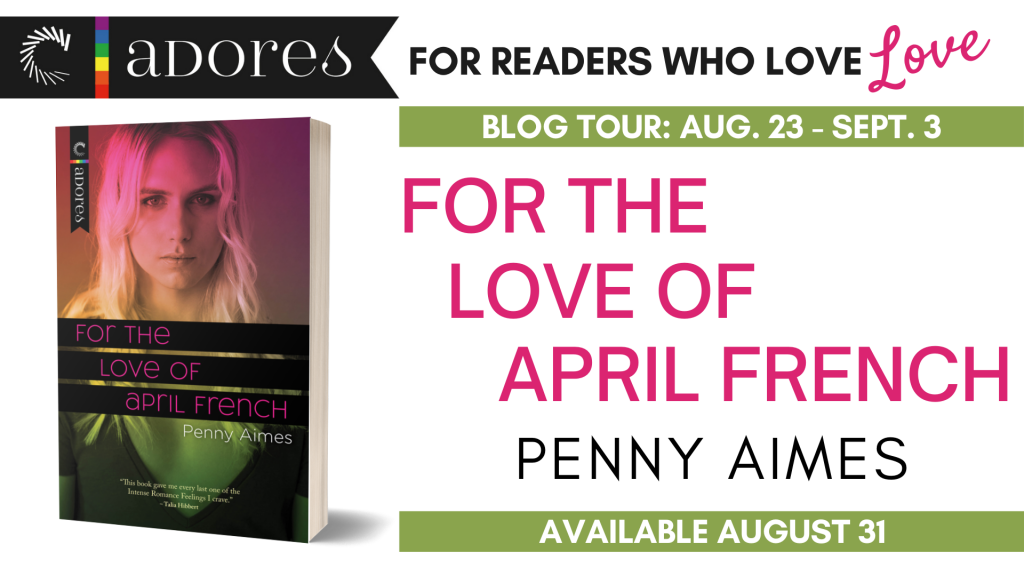

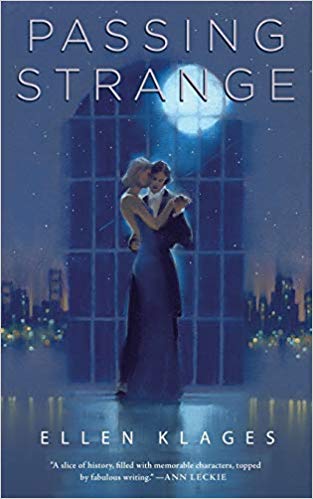 Passing Strange by
Passing Strange by 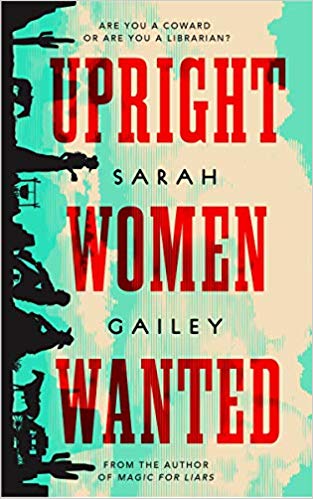 Upright Women Wanted by
Upright Women Wanted by 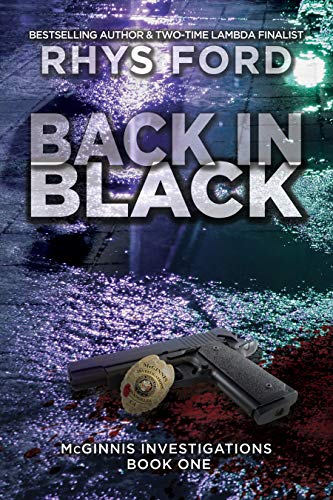 Back in Black (McGinnis Investigations, #1) by
Back in Black (McGinnis Investigations, #1) by  Once upon a time, there was a book titled
Once upon a time, there was a book titled 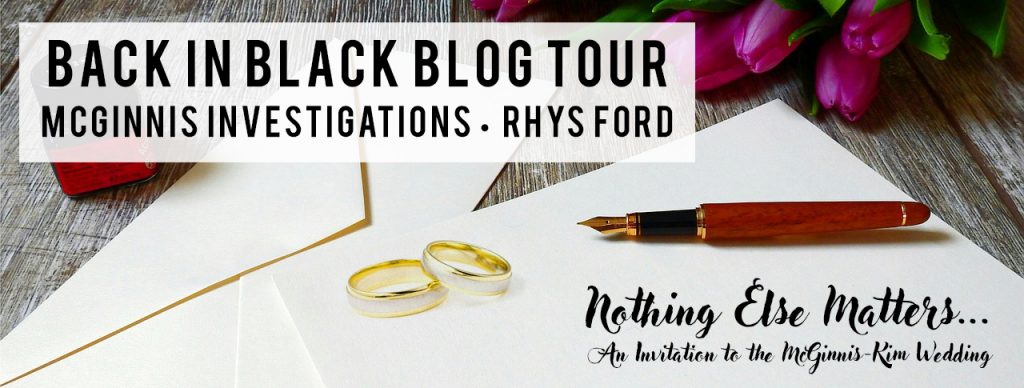
 Enough time has passed between the end of the final book in that series,
Enough time has passed between the end of the final book in that series,